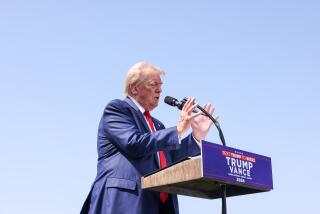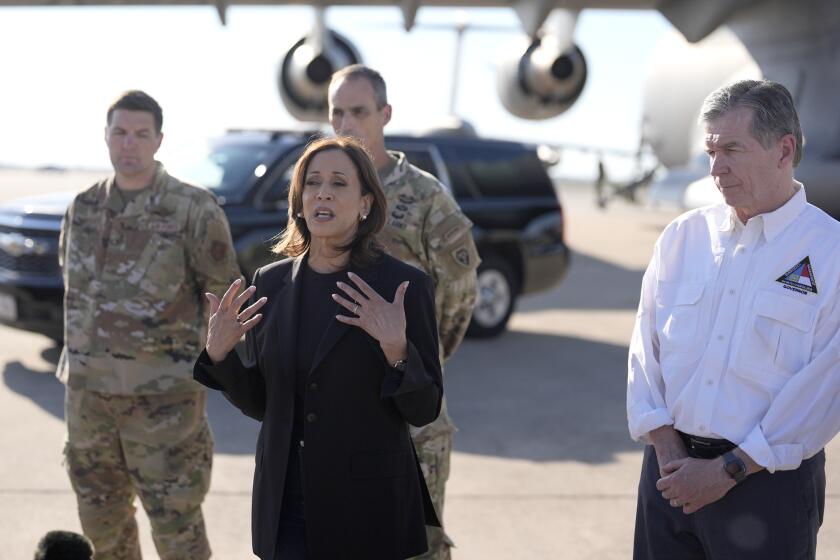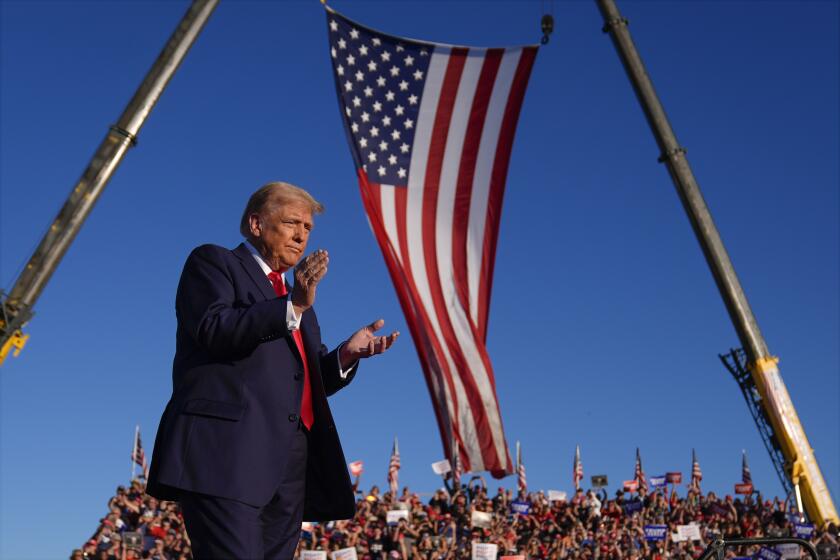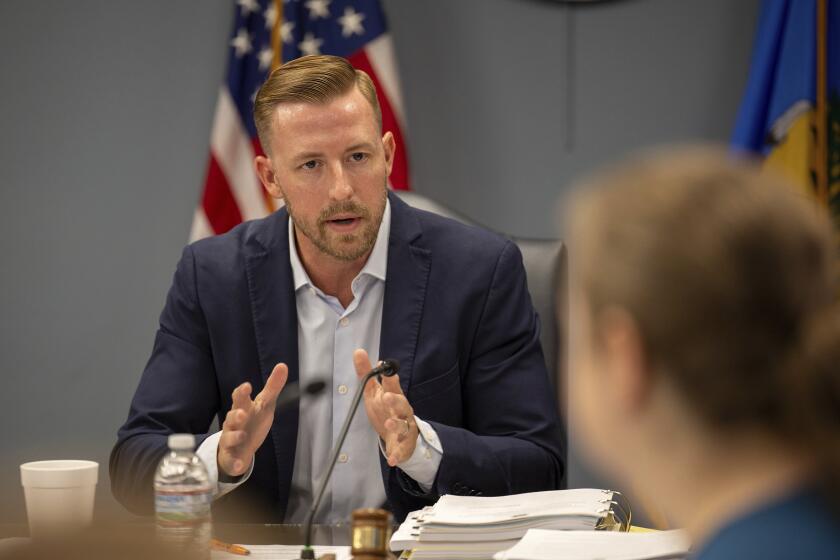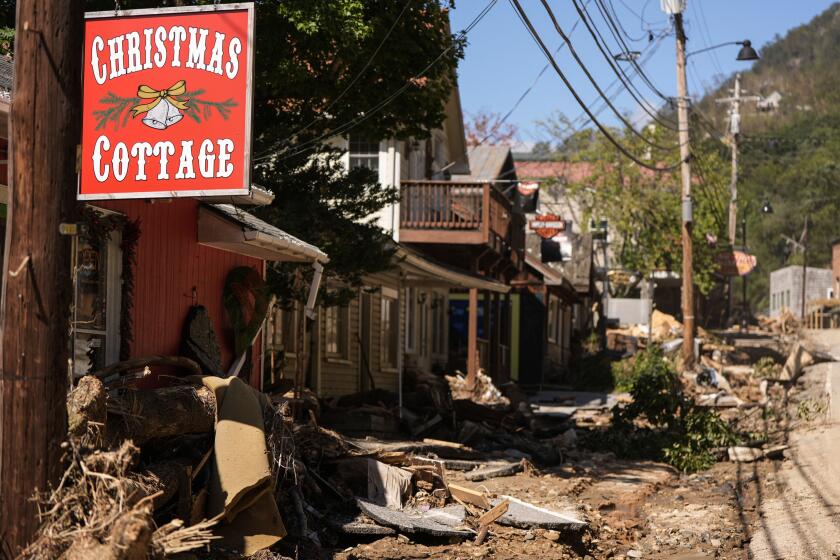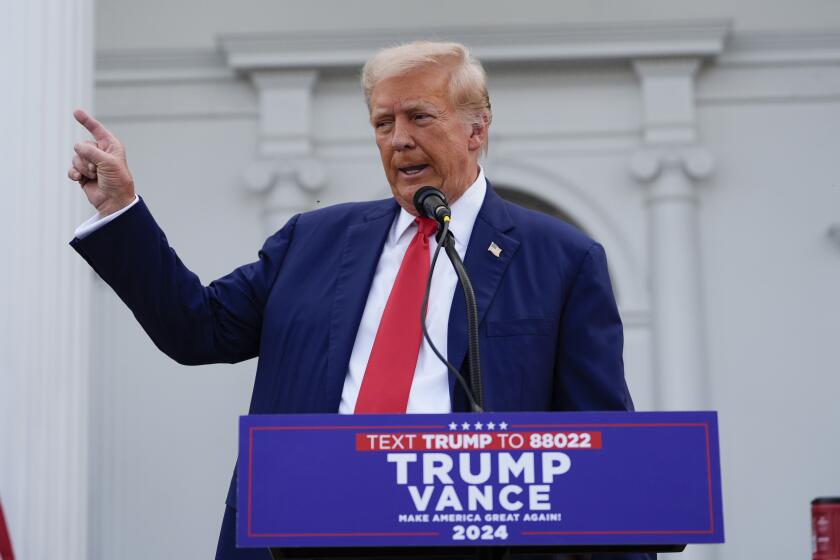Long Standoff Could Stir Host of Problems : Politics: Unless the U.S. gets out of the gulf quickly, terrorism and budget woes could sour public opinion.
As thousands of American soldiers and Marines dig into Saudi Arabian sand in their face-off with Iraq, Washington is warily turning its eye to a gnawing and politically sensitive question: How long will the troops be there?
If the current U.S. deployment turns into a protracted military standoff, as many analysts fear, it could spawn a host of problems for the Administration: Military costs will soar. Terrorism may increase. And most important, the American public, which so far has given strong support to President Bush’s decision to confront Iraq, could begin to reconsider its support.
If that happens, the spirit of bipartisanship that Bush has so carefully nurtured in Congress could start to erode. Such a prospect is particularly unsettling for the military, which still is haunted by the souring of public support for the war in Vietnam in the 1960s.
“The armed forces of the United States will do what the people ask them to do,” said retired Gen. John W. Vessey Jr., chairman of the Joint Chiefs of Staff from 1982 to 1985. “But the way we can help is for us to go in, do what needs to be done in a hurry, and go home. The American people aren’t very tolerant of protracted periods of trouble.”
Some Pentagon strategists fear that Iraqi President Saddam Hussein may already have factored Americans’ historic impatience into his strategy and is planning to dig in for the long haul in hopes that Bush will be compelled to strike some sort of deal.
Ensnaring the Americans in a lengthy deployment of forces could prove to be one of Iraq’s most potent weapons, a government analyst said. Hussein’s strategy is to “let ‘em sweat,” he said. “He’s going to hunker down now, see if he can outlast President Bush and company.”
Moreover, it is not just the length of the current deployment that threatens to erode public support for Bush’s strategy. Here are other factors:
* Analysts warn that a continued presence of U.S. troops in the Persian Gulf may well stir simmering anti-American sentiments in the region, leading to an increase in harassment and terrorism. “If Americans are getting killed by terrorism . . . that will dramatize how different the situation is from Europe,” said Joseph Nye, director of Harvard University’s Center for International Affairs.
* Accidents--commonplace in such deployments--also could weaken support. “There’s always a chopper going down with 15 Marines on it, and then suddenly people get second thoughts,” said Augustus Richard Norton, a fellow at the International Peace Academy in New York.
* Finally--and perhaps potentially a decisive factor--is the possibility that the cost of the U.S. stand in Saudi Arabia will escalate beyond what the public is willing to bear.
Although Pentagon officials said they cannot break down the tab for Operation Desert Shield, as the current deployment is called, they conceded it could easily outstrip that of the U.S. invasion of Panama, which came to about $400 million.
Rear Adm. Eugene La Rocque, director of the Washington-based Center for Defense Information, estimates that the extra cost of deploying U.S. forces to protect Saudi Arabia and its oil will reach at least $300 million a month, even if not a shot is fired.
If shooting were to start in earnest, the cost could quickly triple, or even quadruple, La Rocque asserts.
Most analysts believe a protracted standoff is almost inevitable. Although Bush told Americans last week that “hopefully, (U.S. troops) will not be needed long” in Saudi Arabia, U.S. officials concede privately that the deployment could go on for months--or even years.
“If the sanctions, which are Part One of our strategy, have to be in place for a long time, then the deterrent, which is Part Two, has to be in place for the (same) long time,” a senior official said.
“And sanctions have often proved slow to take effect,” he added. “It’ll require a little bit of patience--maybe a lot patience. We’ve got to be prepared for the long haul.”
Harvard University’s Nye said no matter how the U.S. effort goes, maintaining public support for a protracted standoff in the Middle East is “going to take some skillful political leadership” by the Administration.
“Americans have a history of getting tired of overseas commitments,” he noted.
Even the 38-year commitment of American forces to Europe--a region that differs from the Middle East because of Americans’ longstanding cultural bonds to Europe--has been a subject of perennial, and sometimes bitter, debate in Congress, retired Gen. Vessey recalled.
Experts said Bush’s nationally televised declaration that “appeasement will not work”--a reference to Britain’s disastrous failure to stand up to Adolf Hitler before World War II--may have convinced Americans for the moment that there is a larger principle at stake in Saudi Arabia.
The Administration also is relying on the specter of gasoline lines and fuel shortages--which were prevalent during the oil embargoes of the 1970s--to rally support. Americans have a “very green memory” of these, said former Defense Secretary Caspar W. Weinberger.
Finally, U.S. strategists hope that the public revulsion of Iraqi strongman Hussein will help galvanize public opinion.
“The bond (between Americans and Saudis) is the evil of this character we’re confronting,” a senior Administration official said. And he is “only going to get more difficult and dangerous over time,” the official predicted.
For now, the Administration is trying to avoid sparking discussion about any of the long-term problems that the Middle East deployment may pose. Aboard Air Force One on Friday, en route to a three-week vacation in Maine, Bush dismissed questions about the operation’s expense.
“This is so fundamental to the security of the United States and to the free world . . . that when I went to do this I didn’t say, ‘Listen, please give me a cost estimate to do it,’ ” Bush said. “This is what we have to do.”
But Congress, which has drafted spending bills aimed at making deep cuts in defense spending, may not be as willing to give the President a blank check in the Middle East.
In one of the first and strongest indications of congressional skepticism, House Armed Services Committee Chairman Les Aspin (D-Wis.) sent Bush a letter Friday asking him to define the overriding U.S. objective in Saudi Arabia more clearly.
Aspin also urged the President to spell out more plainly the threat to U.S. economic interests that would be posed if Hussein succeeded in intimidating the Saudis into following his wishes--suggesting that even a successful U.S. operation may not rob Iraq of the ability to dictate oil policy in the region.
And Sen. Sam Nunn (D-Ga.), chairman of the Senate Armed Services Committee, warned the President that the public’s patience would have its limits.
“I hope (the President) can make it clear this is not going to be a long-term, protracted ground presence in Saudi Arabia,” Nunn said. Such a presence “is not desirable, either militarily or certainly psychologically or politically. . . . I do not think that’s in our best interests.”
Meanwhile, most of would-be congressional budget-cutters interviewed by The Times this past week have seemed undeterred by the Middle East situation. With the decline of the military threat to Western Europe, many Democratic lawmakers said that troops, weapons and operations costs still must be pared.
The Pentagon’s special pleas are likely to be greeted with deep skepticism, they said.
Times staff writers Thomas Rosenstiel, David Lauter and John M. Broder contributed to this report.
More to Read
Get the L.A. Times Politics newsletter
Deeply reported insights into legislation, politics and policy from Sacramento, Washington and beyond. In your inbox three times per week.
You may occasionally receive promotional content from the Los Angeles Times.

